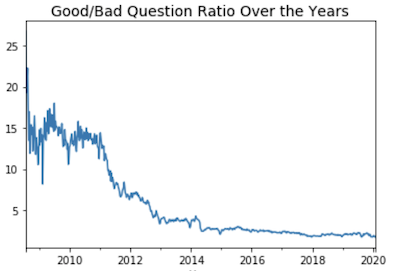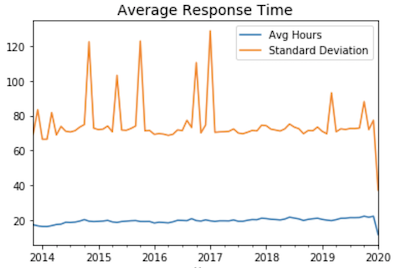What Would Jon Skeet Do?
30 Jan 2020What exactly is a good question on StackOverflow? The answer is literally posted in broad daylight at StackOverflow. This page covers almost everything. Right at the top, you will find a large “Search” hyperlink. While it may seem obvious, the number of questions asked time and time again are insane. Do not frantically post questions without first doing some proper research. Next up, the help page covers how to formulate a well-constructed, professional question, beginning with the title, structure, grammar, the to-dos and not-to-dos, and includes a reminder to proof-read before posting. They even have sub-sections to discuss things like, “How do I ask and answer homework questions?” So why are there still so many bad questions? That is a silly question.
Although my guess is that most people do not take the time to read the help section, perhaps some people just do not even have the time to think about it. They need answers and they need them right away. I know when I am stuck on a problem or have a tight deadline it would be nice to have an answer immediately. Searching takes up too much time, and the time it takes to craft the perfect question might be better spent solving the problem independently. Google is for curiosity, while StackOverflow is for expert, fast, and thorough help. This could be the reason, or it could be that many people do not even care.
I do not want to jump to conclusions, so I decided to heed the advice of the help section and first search for a clue. My search quickly brought me to another awesome resource, StackExchange. This is where we begin the journey for the truth.
Follow the Breadcrumbs
StackExchange allows users to run database queries on all sorts of fun and useful information. Most importantly, many users have already written amazing queries and all we have to do is use them to piece together what may be happening. Ideally, I would love to take the results and run some Machine Learning models to explore the data further, but in the interest of time, I will focus on a few discoveries. If not, I could (and would gladly) spend months sifting through all this data. In fact, if I found this site a few months ago I would have definitely used it for my Probability and Statistics class.
I first looked for some interesting sounding query titles. Here are some examples that I found:
- Good Questions vs. Bad Questions Ratio
- Time to Answer
- Posts containing a very short title
- Most Down-Voted Questions
- Users by Popular Question ratio
- Find the top 200 questions with most views
- Fastest Guns in the West
- High Standards - Top 100 Users that rarely upvote
- Find interesting unanswered questions
- Jon Skeet comparison
Good Questions vs. Bad Questions Ratio
 This is a quick and dirty query that produced a timeline .csv file. Looking at the numbers might not be exciting for everyone, so I downloaded the file and whipped out my Python notebook to quickly make this rudimentary graph. It is pretty apparent that the ratio of good-to-bad questions has plummeted over the years. I have a few guesses as to why that may be, but we might have to dig a bit deeper to find out. My hunch is that the site began with mostly professionals (asking “good” questions) and blew up exponentially as people began finding answers via Google search.
This is a quick and dirty query that produced a timeline .csv file. Looking at the numbers might not be exciting for everyone, so I downloaded the file and whipped out my Python notebook to quickly make this rudimentary graph. It is pretty apparent that the ratio of good-to-bad questions has plummeted over the years. I have a few guesses as to why that may be, but we might have to dig a bit deeper to find out. My hunch is that the site began with mostly professionals (asking “good” questions) and blew up exponentially as people began finding answers via Google search.
Time to Answer
 While I had Python opened and the simple code to make the first graph already up, I decided to download another file and take a look at the average response time over the years. Its curiously stable. The blue line indicates the average time it takes to get an answer is less than 20 hours. However, the standard deviation is quite large so do not be surprised if you need to wait a bit longer. That said, if it has been over a day, or worse, over a week, and your question has some views with no answers, it might mean you need to 1) search for a solution elsewhere, or 2) reword your bad question.
While I had Python opened and the simple code to make the first graph already up, I decided to download another file and take a look at the average response time over the years. Its curiously stable. The blue line indicates the average time it takes to get an answer is less than 20 hours. However, the standard deviation is quite large so do not be surprised if you need to wait a bit longer. That said, if it has been over a day, or worse, over a week, and your question has some views with no answers, it might mean you need to 1) search for a solution elsewhere, or 2) reword your bad question.
Posts containing a very short title
What constitutes a bad question?
Not surprisingly, most of the posts with three words or less have very low scores. This is clue number one. If you only post three words, why would anyone spend more than one second to answer. Time is valuable and most people want to avoid wasting their time, especially if your question winds up being as bad as the title. There was one post, however, that stood out from the rest. It was actually posted 10 years ago and was titled, “TFS vs SVN.” It had about 59 upvotes but was subsequently closed by moderators for being opinion-based. This is another one of the no-nos.
Most Down-Voted Questions
Are questions with a high volume of down-votes bad questions? Yes, and no. One of the top downvoted questions that showed up in the query asked, “How to send 100,000 emails weekly?” When I first saw the title, I wanted to reach into the computer and strangle this spammer (especially seeing that it was tagged PHP), but someone actually responded! And guess what? The answer had five times as many upvotes. They offered a short answer, and a long…and very detailed, answer. Moderators closed the post seven years ago but I am sure plenty of spammers out there are grateful that “Piskvor left the building” responded. After all, it is a valid question if one runs a newsletter. The problem with the question was, other users may have initial reactions similar to mine, and therefore it was ultimately deemed too controversial for StackOverflow.
Users by Popular Question ratio
For an example of a good question, I decided to look at users that commonly post good questions. User “None” had a few. His/her top post, Function pointers, Closures, and Lambda, explains they were learning something new, and while READING a book on the subject, pondered the question, “So why are C-style function pointers fundamentally different from closures or lambdas?” They explained in a bit more detail, and then reiterated the question with a good old-fashioned please and thanks at the end. Not the best question ever, but I can certainly see why it received a number of upvotes.
Find the top 200 questions with most views
How Do I…
What is the best question? I do not have the answer for that but some of the best are found in the next anonymously written query. I forked the query and changed the CreationDate to start searching from to 2010.
Here is an example of the code:
SELECT TOP 200 ViewCount, Id AS [Post Link],
Tags, Title, AnswerCount,
CreationDate
FROM Posts
where CreationDate > '2010/01/01'
ORDER BY ViewCount DESC;
In this case, the details of each question were less important than the overall theme. The all time winner of question views dating back to January, 2010, was phrased, “How do I delete a Git branch locally and remotely?” In fact, seven of the top ten most-viewed questions start with the three little words, “How do I…” (eight if you count “How to.” If you really want your questions answered, try first asking a question. It is a good starting point.
Fastest Guns in the West
If you really REALLY want your questions answered, and quickly, you might want to check out the types of questions answered by these users:
| User Link | Average Response Time |
|---|---|
| Zbigniew | 00:02:48 |
| Suren Srapyan | 00:03:05 |
| John Conde | 00:03:12 |
| Kon | 00:03:17 |
| Daniel A. White | 00:03:27 |
| Adil | 00:03:29 |
| antyrat | 00:03:30 |
| Doorknob | 00:03:30 |
| jeurgen d | 00:03:31 |
| Kamil Budziewski | 00:03:31 |
*Go ahead, check out what types of questions Doorknob answers.
High Standards - Top 100 Users that rarely upvote
Okay, this headline did not sound related to good or bad questions, but I found it interesting and it tied into my next search so ran the query. There are some fairly elite users out there that post regularly but very rarely upvote. Eric Lippert is at the top of the list. I decided to check out his profile to see what might make him tick. He is a Software Engineer at Facebook and most of his most popular posts seem to be answers rather than questions. However, if you are in need of expert advice, feel free to click on his popular answers to see what types of questions Eric is willing to field. Nine of his top ten posts are responses to valid questions. That takes us to the next query.
Find interesting unanswered questions
This is an exciting query. It accepts a userid as a parameter and retrieves a list of questions that have never been answered, but that of which are similar in nature to other questions user typically answers. I then used Eric’s userid, 88656, to run the query and found a list of topics which he might be inclined to answer, if the questions had been more carefully crafted, perhaps. The post “setTextContents Pinvoke C#,” written by userid 2679456 (aka Scott Jasin) is one such question. He used double question marks, profanity, and some exclamation marks. Why then, did no one answer??? I noticed he had a number of other posts left unanswered as well, none of which were titled with actual questions btw.
Jon Skeet comparison
In summary, we sifted through the good, the bad, and the ugly found on StackOverflow and in the end, there is no perfect answer. The thing to remember is to pay attention to how the successful people do things, follow their lead, or try to be better, but most importantly, do your research! And when in doubt, seek out Jon Skeet, the top ranked StackOverlfow guru with a reputation score of 1,160,345 at the time of this post. He is a software engineer at Google so he’s probably doing something right. The “Jon Skeet comparison” query allows you to compare yourself to him if you punch in your userid. Why? Ask someone this question on StackOverflow, see if you get an answer.
Good luck!